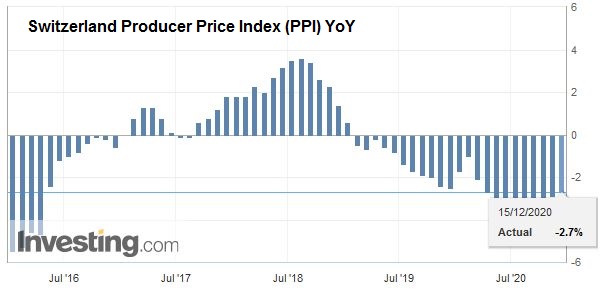The Producer Price Index (PPI) or officially named “Producer and Import Price Index” describes the changes in prices for producers and importers. For us it is interesting because it is used in the formula for the Real Effective Exchange Rate. When producers and importers profit on lower price changes when compared to other countries, then the Swiss Franc reduces its overvaluation. The Swiss PPI values of -6% in 2015 (see below), compared to -3% in Europe or -1% in the U.S., diminished the overvaluation. In 2017, however, producer prices are rising again – in both Europe and Switzerland. See more in Is the Swiss Franc overvalued? 15.12.2020 – The Producer and Import Price Index fell by 0.1% in November 2020 compared with the previous month. The index stood at 97.9
Topics:
George Dorgan considers the following as important: 2.) Swiss Statistics - Press Releases, 2) Swiss and European Macro, Featured, newsletter
This could be interesting, too:
Nachrichten Ticker - www.finanzen.ch writes Die Performance der Kryptowährungen in KW 9: Das hat sich bei Bitcoin, Ether & Co. getan
Nachrichten Ticker - www.finanzen.ch writes Wer verbirgt sich hinter der Ethereum-Technologie?
Martin Hartmann writes Eine Analyse nach den Lehren von Milton Friedman
Marc Chandler writes March 2025 Monthly
The Producer Price Index (PPI) or officially named “Producer and Import Price Index” describes the changes in prices for producers and importers. For us it is interesting because it is used in the formula for the Real Effective Exchange Rate. When producers and importers profit on lower price changes when compared to other countries, then the Swiss Franc reduces its overvaluation. The Swiss PPI values of -6% in 2015 (see below), compared to -3% in Europe or -1% in the U.S., diminished the overvaluation. In 2017, however, producer prices are rising again – in both Europe and Switzerland. See more in Is the Swiss Franc overvalued?
| 15.12.2020 – The Producer and Import Price Index fell by 0.1% in November 2020 compared with the previous month. The index stood at 97.9 points (December 2015 = 100). This decline was due in particular to lower prices for petroleum products and pharmaceutical preparations. Compared with November 2019, the price level of the whole range of domestic and imported products fell by 2.7%. These are the results from the Federal Statistical Office (FSO).
In particular, lower prices for pharmaceutical preparations and petroleum products were responsible for the decrease in the producer price index compared with the previous month. In contrast, rising prices were seen for waste collection and materials recovery as well as for basic pharmaceutical products. The import price index registered lower prices compared with October 2020, particularly for petroleum products as well as petroleum and natural gas. Declining prices were also seen for basic pharmaceutical products, citrus fruit and rubber and plastic products. Non-ferrous metals and products made therefrom, plastics in primary forms, other chemical products and organic products of the chemical industry, on the other hand, became more expensive. |
Switzerland Producer Price Index (PPI) YoY, November 2020(see more posts on Switzerland Producer Price Index, ) Source: investing.com - Click to enlarge |
Download press release: Producer and Import Price Index fell by 0.1% in November 2020
Tags: Featured,newsletter








